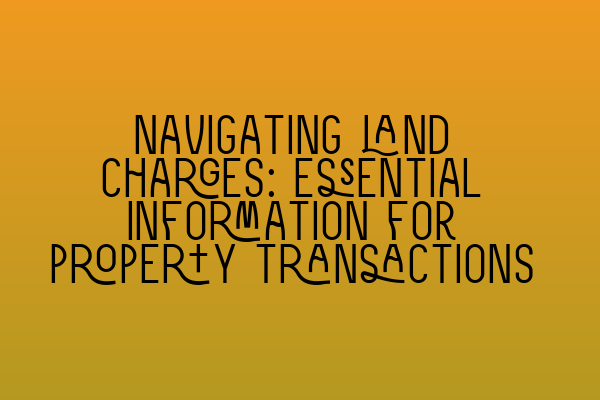Navigating Land Charges: Essential Information for Property Transactions
As a property law and land law solicitor at SQE Property Law & Land Law, I understand the importance of ensuring a smooth and successful property transaction. One key aspect that often requires careful consideration is navigating land charges. In this blog post, I will provide you with essential information to help you understand land charges and how to navigate them effectively.
What are Land Charges?
Land charges are restrictions or obligations that affect a property and are registered against the title. These charges can include a wide range of issues such as mortgages, easements (rights of way), restrictive covenants, and other legal interests. It is crucial to be aware of these charges before entering into a property transaction to avoid any potential complications or legal disputes in the future.
Types of Land Charges
1. Mortgages: One of the most common land charges is a mortgage. When a property is mortgaged, a charge is registered against the title, indicating that the property is being used as collateral for a loan. It is crucial to conduct thorough searches to determine the existence and extent of any registered mortgages against a property.
2. Easements: Easements are legal rights that someone may have over another person’s property. These can include rights of way, drainage rights, or rights to access utilities. It is essential to investigate whether any easements exist and understand their implications on the property and its use.
3. Restrictive Covenants: Restrictive covenants are obligations imposed on a property that limit the way it can be used. These covenants can include restrictions on building extensions, running a business, or even hanging laundry in the garden. It is important to identify any restrictive covenants and ensure compliance to avoid potential legal issues.
4. Planning Obligations: In some cases, a property may be subject to planning obligations or Section 106 agreements. These are legal obligations imposed as part of the planning permission process, such as providing affordable housing or contributing to local infrastructure. It is vital to understand any planning obligations associated with a property to determine their impact on the transaction.
Navigating Land Charges
Now that you have a better understanding of the types of land charges, it is essential to know how to navigate them effectively during a property transaction. Here are some key steps to follow:
1. Conduct Comprehensive Searches: Before proceeding with a property transaction, it is crucial to conduct thorough searches to identify any registered land charges. The results of these searches will provide you with crucial information about the property and any potential issues that may arise.
2. Review Search Results Carefully: Once you receive the search results, review them carefully to identify any registered land charges. Pay close attention to the details of these charges, including their extent, duration, and any restrictions they may impose. This information will help you assess the impact of these charges on the transaction.
3. Seek Legal Advice: It is always advisable to seek legal advice from a qualified solicitor who specializes in property law and land law. They will be able to guide you through the complexities of land charges, analyze the implications, and advise on how to proceed with the transaction.
4. Negotiate Solutions: In some cases, it may be possible to negotiate the removal or modification of certain land charges to ensure a smoother transaction. Working with your solicitor, explore options for resolving any issues that may arise, such as obtaining consent from a mortgagee or renegotiating restrictive covenants.
5. Maintain Clear Documentation: Throughout the transaction, ensure that all relevant documentation, including search results, consent agreements, or modifications to land charges, are properly recorded and filed. This will help safeguard the interests of all parties involved and provide a clear record for future reference.
Conclusion
Navigating land charges is a critical aspect of any property transaction. By understanding the types of land charges, conducting comprehensive searches, seeking legal advice, and maintaining clear documentation, you can ensure a successful and seamless process.
At SQE Property Law & Land Law, our team of experienced solicitors is dedicated to providing exceptional legal guidance for all types of property transactions. If you require assistance with navigating land charges or any other property law matters, please do not hesitate to get in touch.
Related Articles:
– SQE 1 Practice Exam Questions
– SQE 1 Practice Mocks FLK1 FLK2
– SQE 2 Preparation Courses
– SQE 1 Preparation Courses
– SRA SQE Exam Dates
